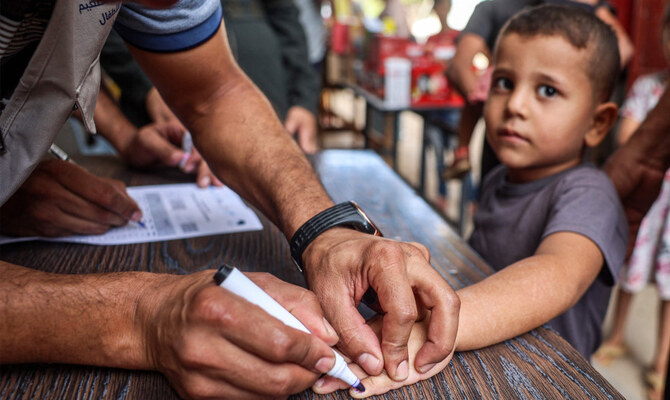GENEVA: The first phase of a large-scale polio vaccination campaign in Gaza has concluded successfully, the World Health Organization said on Wednesday, providing nearly 200,000 children in the center of the Palestinian territory with their initial dose.
With Gaza lying in ruins and the majority of its 2.4 million residents forced to flee their homes due to Israel’s military assault — often taking refuge in cramped and unsanitary conditions — disease has spread.
After the first confirmed polio case in 25 years, a massive vaccination effort began on Sunday, aided by localized “humanitarian pauses” in fighting.
The campaign aims to fully vaccinate more than 640,000 children in the besieged territory, devastated by almost 11 months of war.
During the first phase of the campaign, conducted between September 1 and 3 in central Gaza, more than 187,000 children under the age of 10 were reached, the WHO said in a statement.
“We are grateful for the dedication of all the families, health workers and vaccinators who made this part of the campaign a success despite the dire conditions in the Gaza Strip,” WHO chief Tedros Adhanom Ghebreyesus said on X, formerly Twitter.
“We ask for the humanitarian pauses to continue to be respected. We continue to call for a ceasefire.”
The WHO had estimated that vaccines would be needed for nearly 157,000 children below the age of 10 in central Gaza, but acknowledged that that was an underestimate.
This it said was “due to population movement toward central Gaza, and expanded coverage in areas outside the humanitarian pause zone.”
More than 500 teams, consisting of nearly 2,200 health and community outreach workers, took part in the campaign in central Gaza, with vaccinations provided at 143 fixed sites across the area.
In addition, mobile teams visited tents and hard-to-reach areas, including those outside the agreed humanitarian pause zone.
While the large-scale campaign in central Gaza is over, the WHO said that vaccinations would continue at four large health facilities there over the next few days “to ensure no child is missed in the area.”
The main focus is meanwhile set to move to southern Gaza, where an estimated 340,000 children over the next four days will receive their first dose.
And finally, the campaign will be concentrated in northern Gaza between September 9 and 11, targeting around 150,000 children, the WHO said.
A fresh campaign to provide a needed second dose is due to begin in about four weeks time.
The WHO has stressed that it is vital to reach at least 90 percent coverage to avoid the spread of the disease both within Gaza’s borders and beyond.
“We want to ensure... there will be no other Gaza children who actually will suffer from polio,” Rik Peeperkorn, the WHO’s representative for the Palestinian territories, told reporters on Wednesday.
“But we also want to make sure that we prevent the spread from polio to neighboring countries.”
The October 7 Hamas attack that sparked the war resulted in the deaths of 1,205 people, mostly civilians and including hostages killed in captivity, according to an AFP tally based on Israeli official figures.
Israel’s campaign against Hamas since October 7 has killed at least 40,861 people in Gaza, according to the territory’s health ministry. The UN rights office says most of the dead are women and children.


WHO hails success of polio first phase vaccination campaign in Gaza
Short Url
https://arab.news/r5amj
WHO hails success of polio first phase vaccination campaign in Gaza

- The campaign aims to fully vaccinate more than 640,000 children in the besieged territory, devastated by almost 11 months of war
Israel police say two dead in stabbing, car ramming attack

- The attack came a day after an Israeli military reservist dressed in civilian clothes rammed his vehicle into a Palestinian man in the West Bank
JERUSALEM: A Palestinian from the Israeli-occupied West Bank killed a man and a woman in a stabbing and car-ramming attack in northern Israel before he was shot and wounded on Friday, Israeli police and rescuers said.
“Preliminary investigation indicates this was a rolling terror attack that began in the city of Beit Shean, where a pedestrian was run over,” the police said in a statement, adding the victim was a 68-year-old man.
“Later, a young woman was stabbed near Road 71, and the suspect was ultimately engaged with gunfire near Maonot Junction in Afula following intervention by a civilian bystander,” it said, adding that the attacker was taken to a hospital.
Both the victims succumbed to the injuries, Israel’s emergency service provider Magen David Adom said in a statement.
MDA also reported that a 16-year-old teenager was slightly injured when “hit by a vehicle.”
The Israeli military said the attacker had “infiltrated into Israeli territory several days ago.”
The attack came a day after an Israeli military reservist dressed in civilian clothes rammed his vehicle into a Palestinian man in the West Bank.
“Preliminary investigation indicates this was a rolling terror attack that began in the city of Beit Shean, where a pedestrian was run over,” the police said in a statement, adding the victim was a 68-year-old man.
“Later, a young woman was stabbed near Road 71, and the suspect was ultimately engaged with gunfire near Maonot Junction in Afula following intervention by a civilian bystander,” it said, adding that the attacker was taken to a hospital.
Both the victims succumbed to the injuries, Israel’s emergency service provider Magen David Adom said in a statement.
MDA also reported that a 16-year-old teenager was slightly injured when “hit by a vehicle.”
The Israeli military said the attacker had “infiltrated into Israeli territory several days ago.”
The attack came a day after an Israeli military reservist dressed in civilian clothes rammed his vehicle into a Palestinian man in the West Bank.
© 2025 SAUDI RESEARCH & PUBLISHING COMPANY, All Rights Reserved And subject to Terms of Use Agreement.












